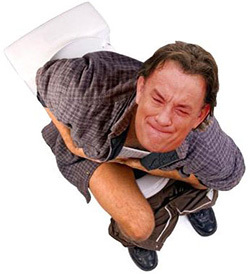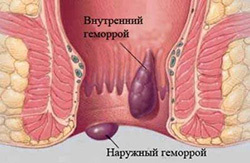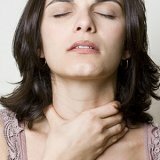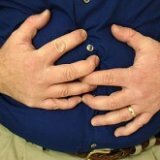Causes and treatment of constipation in men
 Constipation is a pathological condition, the main symptom of which is delayed bowel movements or problems with stool dislocation. Normally, defecation in adults should occur daily, 1-2 times per day, in rare cases - once in 2 days( which is also the norm, but only on condition of a painless and soft stool).
Constipation is a pathological condition, the main symptom of which is delayed bowel movements or problems with stool dislocation. Normally, defecation in adults should occur daily, 1-2 times per day, in rare cases - once in 2 days( which is also the norm, but only on condition of a painless and soft stool).
Contents
- 1 Possible causes of constipation
- 2 Consequences of constipation in men
- 3 Visit a specialist or self-treatment?
- 4 Get rid of constipation
- 4.1 Lifestyle correction
- 4.2 Medications
Possible causes of constipation
The main causes of constipation can be divided into 2 large groups: organic and functional.
Organic constipation of develops due to physical obstruction to fecal matter. These can be:
- tumors of the colon and rectum;
- diverticula( blind intestinal bulge);
- spikes after abdominal surgery;
- presence of sites of pathological expansion of the intestine( eg, with Hirschsprung disease);
- other abnormalities of the intestine structure.
Functional constipation of occurs with various abnormalities of the large intestine, to which
-
 may lead to inadequate fluid intake, as a result of which the feces become excessively dense( see "The Importance of Water for Men's Health");
may lead to inadequate fluid intake, as a result of which the feces become excessively dense( see "The Importance of Water for Men's Health"); - malnutrition - lack of a diet high in fiber and vegetable fat, an overabundance of carbohydrates and refractory fats;
- low motor activity, accompanied by oppression of intestinal peristalsis;
- various diseases of the digestive system( chronic pancreatitis, gastritis, cholecystitis with secretory insufficiency, colitis, etc.);
- trauma and tumor of the head and spinal cord with impaired innervation of the large intestine;
- diseases of other organs( endocrine pathology, severe infections);
- taking certain medications;
- hemorrhoidal nodes and fissures of the anus, in the presence of which a "vicious circle" is formed - defecation is painful, because of which the patient spontaneously and consciously detains it, and with delay the stool becomes dense, injures the mucous membrane and defecation becomes even more painful( see "FirstSigns of hemorrhoids ");
- nervous and psychological problems.
In cases when stool retention occurs more than 48 hours against a background of relatively stable bowel function, acute constipation is reported. Chronic constipation, in addition to regular delays, includes a number of other disorders: soreness in defecation, the need for straining for the stool, increased hardness of the feces, leading to microcracks in the rectum, a feeling of incomplete emptying of the intestine.
Consequences of constipation in men
 The most common complication of chronic constipation is the appearance of cracks in the rectum, the formation of hemorrhoids or the exacerbation of hemorrhoids. Stiffening with defecation and dense, hard stool leads to damage to the mucous membrane, thrombosis and inflammation of the hemorrhoidal veins. In turn, hemorrhoids and cracks even more difficult to defecate.
The most common complication of chronic constipation is the appearance of cracks in the rectum, the formation of hemorrhoids or the exacerbation of hemorrhoids. Stiffening with defecation and dense, hard stool leads to damage to the mucous membrane, thrombosis and inflammation of the hemorrhoidal veins. In turn, hemorrhoids and cracks even more difficult to defecate.
Against the background of chronic constipation, there are other problems:
- inflammatory processes in the intestine - colitis and enterocolitis;
- megacolon - expansion of the intestinal tract by accumulating mucus masses, which aggravates the course of constipation;
- Acute inflammation of the tissue surrounding the rectum( paraproctitis);
- metabolic disorders, manifestations of which are dryness and peeling of the skin, unhealthy complexion, weight loss;
- dysbacteriosis - a violation of the balance of normal intestinal microflora.
In addition, it is believed that chronic constipation is a factor in the increased risk of developing cancer of the rectum and large intestine.
Visit a specialist or self-treatment?
Self-treatment of constipation is permissible only at the initial stages - with beginning, short-lived chronic constipation. In these cases, a positive effect can be obtained from the use of short courses of laxatives and the correction of nutrition and lifestyle. In case of acute constipation, when there is no result from using laxative( purifying enemas) and / or severe pains in the abdomen, weakness, nausea and vomiting occur within 24 hours, emergency medical care is necessary, since this condition can be caused by surgical pathology( intestinal obstructionand etc.).
Long-term chronic constipation also requires an appeal to specialists - primarily to find out the causes of problems with defecation. You can contact a gastroenterologist or therapist who will prescribe the necessary amount of examination and will select the optimal treatment.
We get rid of constipation
For successful treatment of chronic constipation, an integrated approach is required, including medication and non-medicinal measures.
Correction of the lifestyle
Correction of the lifestyle with constipation implies:
- Expansion of the drinking regime - daily consumption of liquid in the volume of at least 2.5-3 liters( water, compotes, fruit drinks, soups).
-
 Diet - with the enrichment of the diet with dietary fiber( their source is fruits, berries and vegetables), the restriction of refractory fats( lard, butter), fried foods, gas-forming products( whole milk, legumes).A good laxative effect is given by carrots, pumpkins, zucchini, beets, plums and apricots;fruit juices with pulp;broth and puree from prunes and dried apricots;honey, fresh( daily) and low-fat dairy products;bran, vegetable oils. It should be borne in mind that in order to obtain the effect of a diet, it is not enough to add "useful products" to the diet, it is necessary to observe some rules for their use. For example, fresh fruit and vegetables should be eaten in the morning, because in the case of admission to the night they do not lead to increased peristalsis, and to the emergence of processes of putrefaction and fermentation in the gut.
Diet - with the enrichment of the diet with dietary fiber( their source is fruits, berries and vegetables), the restriction of refractory fats( lard, butter), fried foods, gas-forming products( whole milk, legumes).A good laxative effect is given by carrots, pumpkins, zucchini, beets, plums and apricots;fruit juices with pulp;broth and puree from prunes and dried apricots;honey, fresh( daily) and low-fat dairy products;bran, vegetable oils. It should be borne in mind that in order to obtain the effect of a diet, it is not enough to add "useful products" to the diet, it is necessary to observe some rules for their use. For example, fresh fruit and vegetables should be eaten in the morning, because in the case of admission to the night they do not lead to increased peristalsis, and to the emergence of processes of putrefaction and fermentation in the gut. - Extension exercise - morning exercise, regular jogging or walking for at least 2 hours a day, special exercises and swimming helps the intestines work.
Drugs
Of the drugs for constipation, the following groups of drugs are used:
Laxative
Laxatives include several types of drugs that differ in the mechanism of action and application. This includes osmotic laxatives( saline, lactulose, lactitol, macrogol), working by:
- "Attracting" water.
- Increases the volume of feces.
- Dilution of stool.
- Intensification of intestinal peristalsis.
The use of salt laxatives( magnesium sulfate) is acceptable in case of acute stool delay. Long-term use of magnesium sulfate is not recommended due to the danger of developing unwanted side-effects.
preparations of lactulose( Duphalac, Normase, dinolak), lactitol( eksportal), macrogol( forlaks) and advanced tools for local use( microclysters microlax) can be used relatively long time, since they do not provide significant side effects.
Another type of laxatives - tools aimed at activation of peristalsis and promotion of feces. These include drugs senna( sennade, regulaks), buckthorn( dried berries, buckthorn extract in pill and liquid), bisacodyl( dulkolaks) - they are also used for a long time. However, it should be remembered that course treatment with any laxative means always requires prior consultation with a doctor.
preparations from other groups
When combined treatment of constipation is often connected pre- and probiotics to normalize the intestinal microflora( lineks, Atsipol, normobakt), multivitamin( hypovitaminosis for correction), nootropics( for combating the effects of acute and chronic stress, fatigue).
In cases where chronic constipation is caused by organic pathology( adhesions, tumors), surgical intervention may be required to successfully control them. Constipation against the background of certain diseases and conditions( diseases of the gastrointestinal tract, endocrine disorders) require compulsory treatment of the underlying disease.
Recommended for viewing:



